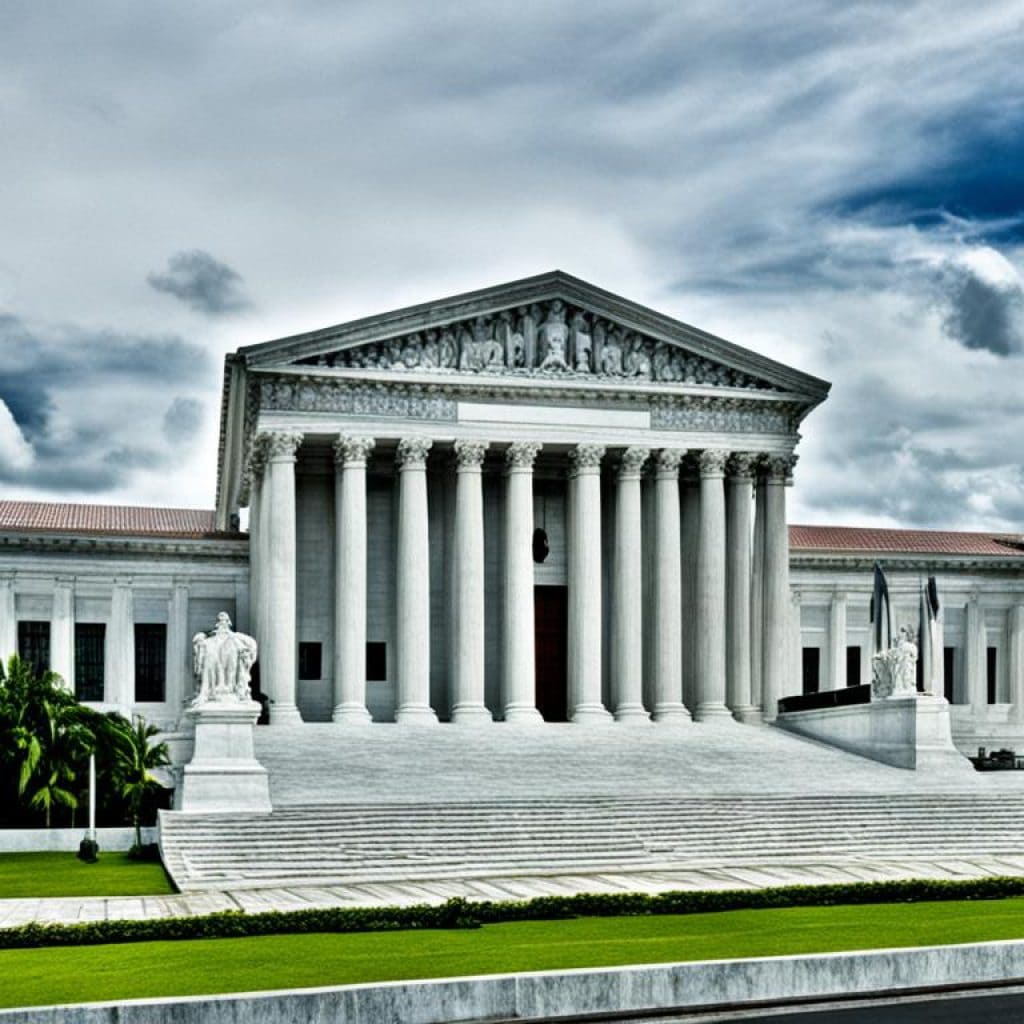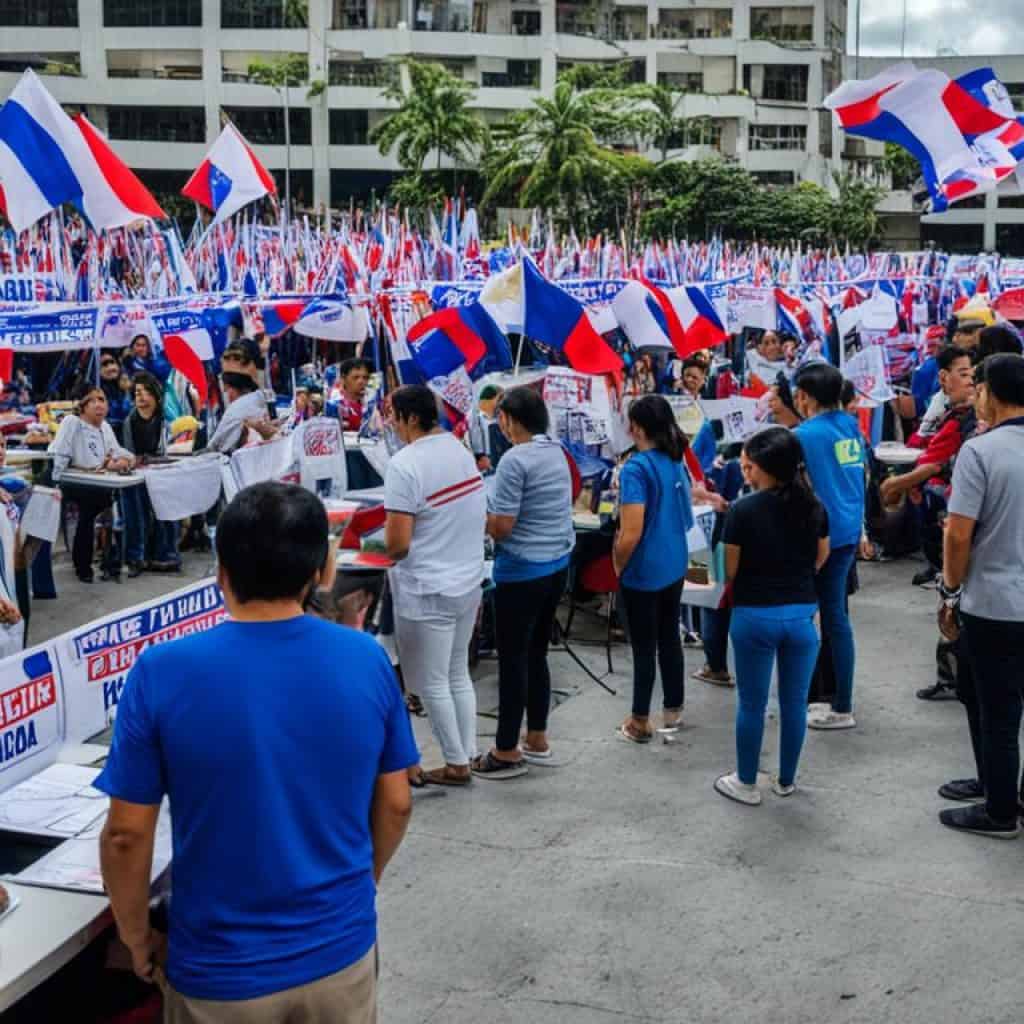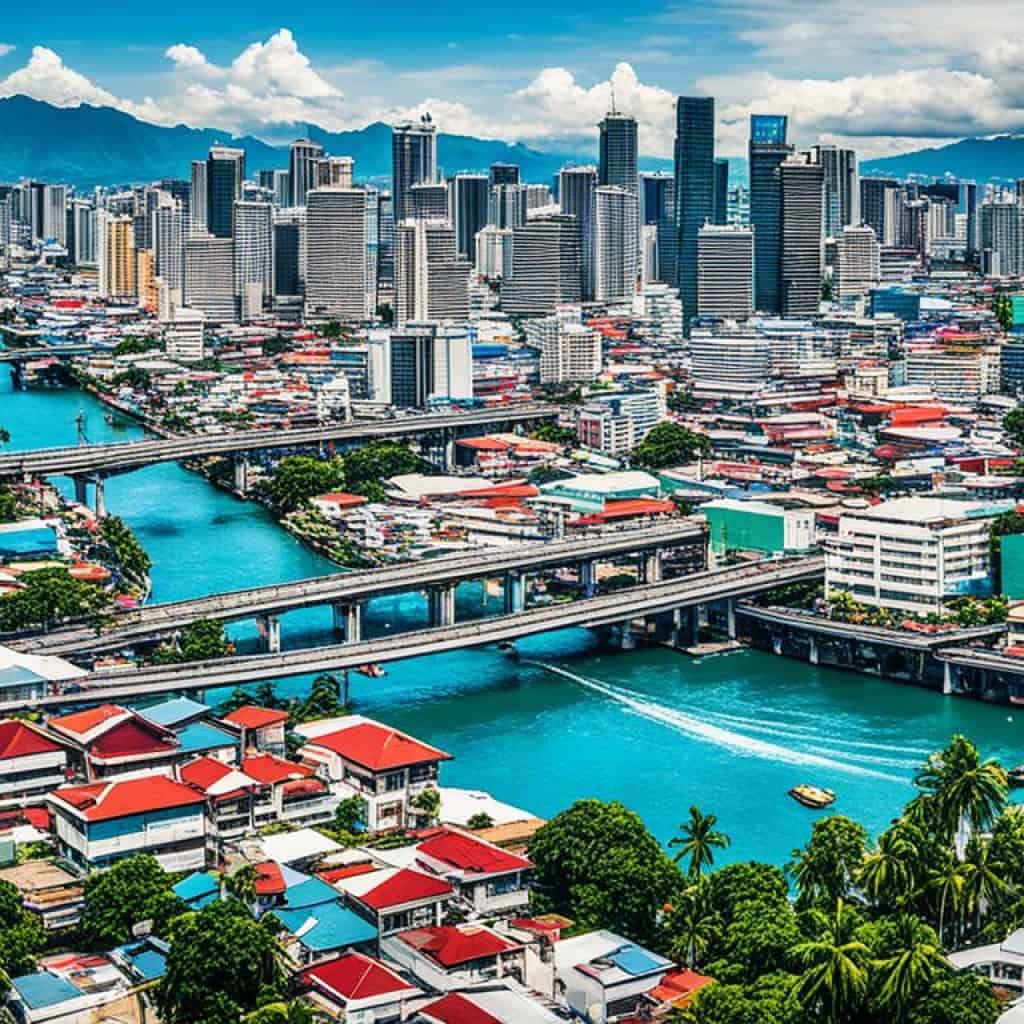Have you ever wondered how the Philippine government operates? What are the different branches of government and what roles do they play? In this article, we will delve into the intricacies of the branches of government in the Philippines, unraveling the mysteries behind their functions and the Philippine government structure. Prepare to gain a comprehensive understanding of the interdependent branches that govern the nation and how they work together to uphold democracy.
Let’s embark on a journey of discovery as we explore the executive, legislative, and judicial branches. Join us as we delve into their powers, responsibilities, and the importance of citizen participation in the democratic process. Are you ready to unravel the secrets of the Philippine government?
Key Takeaways:
- The Philippine government consists of three branches – executive, legislative, and judicial.
- The executive branch is headed by the President and is responsible for enforcing laws.
- The legislative branch comprises the Congress, which has the power to make and amend laws.
- The judicial branch, led by the Supreme Court, interprets laws and ensures their constitutionality.
- Understanding the branches of government is crucial for citizen participation and a thriving democracy.
The Executive Branch of Government in the Philippines
The executive branch of the Philippine government plays a crucial role in the country’s governance and decision-making processes. At the helm of this branch is the President of the Philippines, who is elected by the people for a term of six years. As the head of state, the President wields significant power and carries out various responsibilities that are essential to the functioning of the government.
“The executive power shall be vested in the President of the Philippines.” – Constitution of the Republic of the Philippines
Under the executive branch, the President holds numerous responsibilities, including the enforcement of laws, the implementation of policies, the management of executive departments and agencies, and the formulation of the legislative agenda. As the chief executive, the President has the authority to make key decisions that affect the nation and its citizens.
The executive branch works in close collaboration with the legislative and judicial branches of the government to ensure a system of checks and balances. This system prevents any single branch from becoming too powerful and safeguards the rights and interests of the Filipino people.
The Role of the President:
- Carrying out and enforcing laws
- Leading executive departments and agencies
- Setting the legislative agenda
- Representing the country in international affairs
- Appointing officials to key government positions
- Granting pardons
- Vetoing bills (subject to congressional override)
“The President has the power and duty to protect, preserve, and defend the Constitution.”
As the highest-ranking official in the executive branch, the President has the responsibility to uphold and defend the Constitution of the Republic of the Philippines. This role ensures that the rule of law is maintained and that the rights and liberties of all Filipinos are protected.
The executive branch, led by the President, plays a critical role in the governance of the Philippines. By executing laws, implementing policies, and leading the government’s efforts, the executive branch helps shape the direction of the country and ensures the well-being of its citizens.
The Legislative Branch of Government in the Philippines
The legislative branch of the Philippine government plays a crucial role in the country’s governance. It is composed of the Congress, which is further divided into two chambers – the Senate and the House of Representatives. The Congress holds the power to make, alter, and repeal laws, as well as approve the national budget. Let’s explore the functions and responsibilities of the legislative branch in more detail:
The Senate
The Senate is one of the two chambers of the Congress, consisting of 24 senators who are elected by the Filipino people. Each senator serves a term of six years, with half of the Senate facing elections every three years. The Senate has several key functions:
- Enacting laws: Senators propose and draft bills that aim to address societal issues and concerns.
- Confirming appointments: The Senate has the authority to confirm or reject appointments made by the President, including cabinet members, ambassadors, and justices.
- Ratifying treaties: The Senate plays a crucial role in the ratification of international treaties and agreements.
The House of Representatives
The House of Representatives is the other chamber of the Congress, consisting of representatives known as congressmen or congresswomen. The Philippines has a total of 243 legislative districts, with each district electing one representative. The House of Representatives has the following functions:
- Making laws: Congressmen propose and pass bills that represent the interests of their respective districts.
- Initiating the national budget: The House of Representatives has the power to propose and approve the annual national budget.
- Impeachment proceedings: The House of Representatives has the exclusive power to initiate impeachment proceedings against high-ranking officials, including the President and Supreme Court justices.
The legislative branch of the Philippine government, through its two chambers – the Senate and the House of Representatives, serves as a check and balance to the executive branch. It ensures that laws are enacted, policies are formulated, and the national budget is approved in a manner that represents the best interests of the Filipino people.
Key Functions of the Legislative Branch
| Functions | Description |
|---|---|
| Making Laws | The legislative branch has the authority to propose, draft, and pass laws that govern the nation. |
| Approving the National Budget | The Congress, as part of its responsibility, must approve the annual national budget, ensuring proper allocation of resources and funds. |
| Checks and Balances | The legislative branch acts as a check on the executive branch by overseeing its actions and ensuring accountability. |
| Representing the People | Members of the legislative branch, elected by the people, serve as their representatives and voice their concerns and interests. |
| Oversight and Investigation | The legislative branch has the power to conduct inquiries, investigations, and oversight to ensure transparency and accountability. |
The Judicial Branch of Government in the Philippines
The judicial branch of the Philippine government plays a vital role in upholding the rule of law and ensuring justice for all. At the helm of this branch is the esteemed Supreme Court, which stands as the highest court in the land.
With the power of judicial review, the judiciary evaluates and interprets the meaning of laws, ensuring that they align with the provisions of the Constitution. This critical function allows the court to safeguard the rights and liberties of individuals while maintaining the harmony of the Philippine political system.
The Supreme Court is composed of highly qualified and experienced justices, nominated by the President and confirmed by the Commission on Appointments. These justices possess the expertise and knowledge required to apply the law to individual cases and render fair, impartial judgments.
The decisions made by the Supreme Court set precedents that guide lower courts and shape the legal landscape of the country. Through their meticulous analysis and interpretation of laws, the justices contribute to the development of jurisprudence and the continuous evolution of the Philippine legal system.
When controversies arise, the Supreme Court acts as the final arbiter, rendering conclusive decisions that settle disputes and provide clarity on legal matters. This ensures consistency and stability in the application of laws across the nation.
The role of the judicial branch extends beyond interpreting laws; it also serves as a check on the other branches of government. Through the exercise of its powers, the judiciary can nullify laws that are found to be unconstitutional and strike a balance in the exercise of authority.
Furthermore, the Philippine judiciary is committed to promoting transparency and accountability within its own ranks. Initiatives such as the Judicial Integrity Board and the Judicial and Bar Council have been established to strengthen judicial governance, maintain the integrity of the judiciary, and enhance public confidence in the justice system.
“The judiciary is the guardian of the Constitution, the protector of the people’s rights, and the arbiter of justice.” – Justice Alexander Gesmundo, Chief Justice of the Philippines
This crucial branch of the Philippine government ensures that the principles of fairness, justice, and the rule of law are upheld. By providing a balanced and independent judicial system, the Philippine judiciary safeguards the rights and liberties of its citizens.
The Structure of the Philippine Judicial Branch
| Position | Responsibilities |
|---|---|
| Supreme Court | Headed by the Chief Justice, it exercises the power of judicial review and finalizes court decisions. |
| Lower Courts | Includes Regional Trial Courts, Municipal Trial Courts, Municipal Circuit Trial Courts, and Shari’a District Courts. They handle various civil, criminal, and administrative cases. |
| Specialty Courts | These courts have jurisdiction over specific types of cases, such as the Sandiganbayan for government officials accused of graft and corruption, and the Court of Tax Appeals for tax-related disputes. |
Through its structure and functions, the judicial branch of the Philippine government ensures the fair administration of justice, protecting the rights and welfare of all citizens.
Powers and Functions of the Executive Branch
The executive branch in the Philippine government is responsible for executing laws, managing the government bureaucracy, and implementing policies and programs that are crucial for the nation’s development and progress.
As the head of this branch, the President holds significant powers and responsibilities. These include:
- Executing Laws: The executive branch ensures that laws passed by the legislative branch are faithfully carried out and enforced. This involves the implementation of policies and regulations for the benefit of the Filipino people.
- Managing the Government Bureaucracy: The executive branch oversees and manages the various government agencies and departments. This includes coordinating their efforts, setting goals, and ensuring efficient and effective service delivery to the public.
- Implementing Policies and Programs: The executive branch plays a crucial role in formulating and implementing policies and programs that address the needs and aspirations of the Filipino people. This includes economic development initiatives, social welfare programs, and infrastructure projects.
- Veto Power: The President has the power to veto bills passed by the legislative branch. This serves as a vital check and balance mechanism, ensuring that proposed laws align with the executive branch’s goals and priorities.
- Pardons and Reprieves: The executive branch has the authority to grant pardons and reprieves to individuals convicted of crimes. This power allows for the exercise of mercy and clemency when deemed necessary.
- Appointment of Officials: The President appoints key officials in the different branches of government, helping shape the direction and composition of the public service. These appointments are critical in ensuring capable and qualified leaders at every level of governance.
- Representation in International Affairs: The executive branch represents the Philippines in international relations, negotiations, and agreements. This includes engaging with foreign governments, participating in international organizations, and safeguarding the national interests of the Philippines on the global stage.
The powers and functions of the executive branch are essential for effective governance and the realization of the Philippine government’s objectives. It is through these powers that the President leads and guides the nation towards progress and prosperity.
Now, let’s take a closer look at the roles and responsibilities of the legislative branch in the Philippines.
Legislative Powers and Responsibilities
The legislative branch, composed of the Congress, plays a crucial role in the Philippine government system. As the primary law-making body, it holds the authority to make, amend, and revoke laws through the process of legislation. This power allows the legislative branch to shape policies and regulations that directly impact the lives of Filipinos and the development of the nation.
One of the key responsibilities of the legislative branch is to exercise oversight and checks and balances on the executive branch. Through legislative hearings and inquiries, Congress ensures accountability and transparency in the implementation of laws and government programs. It provides a platform for discussions, debates, and deliberations on issues of national importance, ensuring that the interests and concerns of the people are heard and addressed.
“The legislative branch acts as the voice of the people, representing their needs, aspirations, and concerns,” says Senator Maria Santiago, Chairperson of the Senate Committee on Legislation. “It is our duty to carefully examine and scrutinize proposed laws and policies to ensure their effectiveness and alignment with the welfare of our constituents.”
The legislative branch is also responsible for approving the national budget. Through the power of the purse, Congress allocates public funds, ensuring that resources are allocated efficiently and effectively to address the needs of the nation. This responsibility entails reviewing and deliberating on the proposed budget, making adjustments, and prioritizing allocations based on the country’s development goals and priorities.
Role of Congress in the Philippines
Congress, composed of the Senate and the House of Representatives, serves as the platform for democratic representation in the Philippines. Senators and members of the House of Representatives are elected by the people, giving them the mandate to voice and advocate for the interests and concerns of their respective constituencies.
Senator Santiago emphasizes the importance of Congress in the legislative process, stating, “The role of Congress is not only to pass laws but also to be the bridge between the people and the government. By engaging with our constituents, we gather valuable insights and perspectives that help shape inclusive and responsive legislation.”
Congress also plays a vital role in the impeachment process, as stipulated in the Philippine Constitution. It has the power to initiate and conduct impeachment proceedings against public officials, including the President, Vice President, Supreme Court justices, and other appointed officials. This responsibility ensures accountability and integrity within the government, holding officials to the highest standards of public service.
Overall, the legislative branch is a fundamental pillar of the Philippine government. By enacting laws, providing oversight, and representing the voice of the people, Congress contributes to the democratic governance of the country, striving to create a just and progressive society for all Filipinos.
The Role of the Judiciary in the Philippine Government
The judiciary plays a crucial role in the Philippine government by interpreting laws and ensuring their constitutionality. Led by the Supreme Court of the Philippines, the judicial branch has the power to settle disputes, decide on legal cases, and protect individual rights and liberties.
The Supreme Court, as the highest court in the land, holds the responsibility of evaluating and interpreting the meaning of laws. It applies these laws to individual cases, ensuring that justice is served and the rights of all individuals are upheld.
One of the primary functions of the judiciary is to settle disputes, whether they are between individuals, organizations, or branches of government. The courts provide a platform where conflicting parties can present their arguments and have a fair and impartial decision made. This helps maintain peace, order, and stability within society.
“Justice is the end of government. It is the end of civil society. It ever has been and ever will be pursued until it be obtained, or until liberty be lost in the pursuit.” – James Madison
Through their decisions, the judiciary sets legal precedents that guide future rulings and interpretations. This ensures consistency and predictability in the application of laws, promoting stability and fairness in the legal system.
The role of the judiciary extends beyond settling disputes and interpreting laws. It also acts as a safeguard for individual rights and liberties, ensuring that government actions do not violate the Constitution. The judiciary has the authority to declare laws or executive actions unconstitutional if they conflict with the fundamental rights enshrined in the Philippine Constitution.
The Supreme Court of the Philippines
The Supreme Court, as the pinnacle of the judicial branch, holds a pivotal role in the Philippine government. It is composed of 15 members, including the Chief Justice, who are appointed by the President and confirmed by the Commission on Appointments.
The Court’s decisions are binding and have a significant impact on the country’s legal landscape. Whether it is interpreting a provision of the Constitution, resolving conflicts between laws, or ruling on challenging legal issues, the Supreme Court’s decisions shape the course of jurisprudence in the Philippines.
Key functions of the Supreme Court include:
- Interpreting the meaning and constitutionality of laws
- Reviewing decisions and actions of lower courts and government agencies
- Adjudicating cases involving constitutionality, legality, and public importance
- Issuing rules and regulations to ensure the fair administration of justice
- Administering the Philippine Judicial Academy to train and educate judges and court personnel
The Supreme Court’s dedication to upholding the rule of law, ensuring equal treatment under the law, and protecting individual rights is instrumental in maintaining a just and transparent society in the Philippines.

Next, we will explore the relationships and interactions between the branches of government in the Philippines, highlighting the system of checks and balances that promotes accountability and prevents the concentration of power.
Relationships Between the Branches of Government in the Philippines
The branches of government in the Philippines work together in a system of checks and balances, ensuring that no single branch becomes too powerful. This structure allows for the separation of powers and a balance of authority within the government.
The executive, legislative, and judicial branches each have distinct roles and functions, which collectively contribute to the stability and effectiveness of the Philippine political system. Let’s take a closer look at how these branches interact:
- The executive branch is responsible for carrying out and enforcing laws, with the President as its head. The executive branch sets the priorities and agenda for the government, proposes and implements policies, and manages the day-to-day operations of the country.
- The legislative branch is tasked with making, amending, and revoking laws. It is composed of the Congress, which consists of two chambers: the Senate and the House of Representatives. The Congress also has the power to approve the national budget and conduct oversight on the executive branch.
- The judicial branch is responsible for interpreting laws and ensuring their constitutionality. The Supreme Court, as the highest court in the Philippines, plays a crucial role in resolving legal disputes, protecting individual rights, and upholding the rule of law.
Through their respective powers and functions, the branches of government provide a system of checks and balances that prevent any one branch from becoming too dominant. This arrangement promotes transparency, accountability, and the protection of democratic principles.
By upholding the principles of the Philippine political system, the branches of government work together to ensure a fair and just society, where the rule of law is upheld and the rights of citizens are protected.
| Branch of Government | Main Functions | Examples |
|---|---|---|
| Executive Branch | Enforcing laws, setting government agenda, managing the bureaucracy | President overseeing government operations |
| Legislative Branch | Making, amending, and revoking laws, approving the national budget | Congress passing legislation |
| Judicial Branch | Interpreting laws, protecting individual rights, ensuring constitutionality | Supreme Court deciding legal cases |
In the next section, we will delve into the Philippine government structure at the local level, exploring the roles and functions of local government units in further detail.
The Philippine Government Structure at the Local Level
In addition to the national government, the Philippines has a system of local government units, which play a vital role in governance and public administration. These local government units include provinces, cities, municipalities, and barangays, each with its own set of executive, legislative, and judicial branches.
The local government units are responsible for addressing the needs and concerns of their respective communities, ensuring effective service delivery, and promoting local development. By decentralizing power and decision-making, the Philippine government aims to bring governance closer to the people and empower local communities to participate in local affairs.
At the local level, the executive branch is headed by the governor in provinces, the mayor in cities and municipalities, and the barangay captain in barangays. They are responsible for implementing local laws, managing local resources, and providing essential services to their constituents.
The legislative branch in local government is composed of the Sangguniang Panlalawigan (Provincial Council), Sangguniang Panlungsod (City Council), Sangguniang Bayan (Municipal Council), and Sangguniang Barangay (Barangay Council). These legislative bodies have the power to enact local ordinances, approve budgets, and oversee the executive’s performance.
The judicial branch at the local level includes the Metropolitan Trial Courts, Municipal Trial Courts, Municipal Circuit Trial Courts, and Barangay Courts. These courts handle cases within their jurisdiction and ensure that justice is served in their respective areas.
The local government units play a crucial role in fostering local development, promoting good governance, and addressing the specific needs and concerns of their communities. They serve as a vital link between the national government and the grassroots level, working hand-in-hand to achieve inclusive and sustainable development throughout the country.
Overall, the Philippine government structure at the local level seeks to empower local communities, encourage citizen participation, and ensure effective governance closer to the people. It is through this multi-level governance system that the government aims to promote local development, deliver efficient public services, and address the diverse needs of its citizens.
The Importance of Elections in the Philippine Government
Elections are an integral part of the Philippine government, playing a significant role in the democratic process. They serve as a fundamental mechanism for citizens to exercise their right to choose their representatives and leaders. Through the electoral process, the voice of the people is heard, and important decisions that shape the direction of the country are made.
Philippine elections empower individuals by giving them the power to vote for candidates who they believe will best represent their interests and values. It allows citizens to select leaders who will be responsible for making crucial decisions on legislation, policies, and governance. By casting their votes, citizens actively participate in shaping the government that will work for their welfare and the nation at large.
“Elections not only provide a platform for citizens to express their preferences, but they also serve as a mechanism to hold government officials accountable.”
Moreover, elections promote transparency and accountability within the Philippine government. When elected officials are aware that their tenure is subject to the will of the people, they are incentivized to work diligently, fulfill their promises, and deliver on their campaign pledges. The electoral process serves as a check and balance, ensuring that those in power are mindful of the needs and aspirations of the electorate.
The role of elections in the Philippines extends beyond the selection of leaders. They also facilitate the peaceful transition of power, fostering stability and continuity in governance. Through the democratic process, leaders emerge through fair elections, ensuring that the transfer of authority is based on the mandate of the people.
The importance of elections in the Philippine government cannot be overstated. They empower citizens, promote accountability, and contribute to the overall development and progress of the country. By participating in elections, individuals exercise their civic duty and actively shape the future of their nation.

How to Register and Vote in the Philippines
Participating in the electoral process is a fundamental right for eligible citizens in the Philippines. Registering as a voter is the first step towards exercising this right and having a say in the country’s governance. This section provides a step-by-step guide on voter registration and the voting process in the Philippines, emphasizing the importance of actively engaging in the democratic system.
Step 1: Voter Registration
- Gather necessary documents: Bring a valid government-issued ID, such as a passport or driver’s license, and proof of residency, such as a utility bill or government-issued ID showing your address.
- Locate the nearest Commission on Elections (COMELEC) office: Visit the COMELEC website to find the nearest registration center or satellite office.
- Visit the registration center: Go to the designated registration center and fill out the voter registration form.
- Submit the requirements: Submit your completed form and the required documents to the COMELEC personnel.
- Biometrics capture: Have your biometrics (photograph, fingerprints) taken at the registration center.
- Receive acknowledgement receipt: Once you have completed the registration process, you will receive an acknowledgement receipt. Keep this receipt for future reference.
It is important to note that voter registration usually takes place during specified periods announced by the COMELEC. Be sure to stay updated on the registration schedule to avoid missing the opportunity to register.
Step 2: Voting Process
After registering as a voter, you will have the opportunity to exercise your right to vote in elections. The voting process in the Philippines typically involves the following steps:
- Check your precinct: Prior to the election, check your designated voting precinct. This information is typically found on your voter’s ID, acknowledgment receipt, or through the COMELEC website.
- Prepare valid ID: On election day, bring a valid government-issued ID for identification purposes.
- Visit the polling place: Go to your designated polling place during the allocated voting hours.
- Queue up: Join the queue and wait for your turn to enter the voting area.
- Secure ballot: Once inside the voting area, a COMELEC personnel will provide you with a ballot. Take note of any instructions given.
- Mark your choices: Carefully mark your choices on the ballot. Make sure your selections are clear and within the designated spaces.
- Cast your vote: Proceed to the vote-counting machine (VCM) and insert your ballot into the machine. Wait for the acknowledgment receipt before leaving the voting area.
Remember, your vote is your voice. By actively participating in the electoral process, you contribute to shaping the future of the Philippines and the policies that impact your life.
Key Documents for Voter Registration
| Required Document | Accepted IDs |
|---|---|
| Valid Government-Issued ID | Passport, Driver’s License, Postal ID, SSS/GSIS ID, etc. |
| Proof of Residency | Utility Bill, Barangay Certification, Government-Issued ID with Address, etc. |
Why Voting Matters in the Philippines
Voting is an essential pillar of democracy, and its importance cannot be overstated in the context of the Philippines. It holds the power to shape the government and determine the policies that directly impact the lives of its citizens. By actively participating in the voting process, individuals can contribute to nation-building and drive progress in the country.
When citizens exercise their right to vote, they exercise their voice and hold the power to elect leaders who represent their values and aspirations. By casting a vote, individuals send a clear message about the kind of government they believe in and the direction they want the country to take.
Moreover, voting ensures that the government remains accountable to its citizens. Elected officials are aware that their positions depend on the support of the people, and thus they are more likely to listen to their constituents and act in their best interests. This accountability fosters a government that is responsive, transparent, and committed to serving the needs of the people.
The Power to Create Change
Voting provides individuals with the power to effect meaningful change in the Philippines. Through the democratic process, citizens can choose leaders who prioritize inclusivity, social justice, economic progress, and environmental sustainability. By electing representatives who champion these causes, voters actively contribute to the advancement of their communities and the overall development of the country.
“Voting is the cornerstone of democracy, and it is through the power of the ballot that we can shape the future of our nation.”
Every vote counts, and each voter plays a crucial role in the collective decision-making process. Whether it’s selecting leaders who will implement policies to improve education, healthcare, infrastructure, or ensuring fair representation for marginalized groups, every vote is a step towards building a better Philippines.
Engaging in the Democratic Process
Voting is not only a right but also a privilege that comes with responsibilities. It allows citizens to actively participate in the democratic process, making their voices heard and influencing the policies that affect their lives. By staying informed about the issues, understanding the platforms of candidates, and exercising their right to vote, individuals contribute to a vibrant and robust democracy in the Philippines.
Furthermore, voting provides an opportunity for citizens to unite and work towards common goals. It serves as a reminder that the power to shape the nation lies in the hands of the people. By coming together during elections, citizens can bridge divides, build coalitions, and collectively address the challenges and aspirations of the Filipino people.
| Benefits of Voting | Key Takeaways |
|---|---|
| 1. Ensures representation and accountability | • Voting allows citizens to elect leaders who represent their values and aspirations. • Elected officials are accountable to the people, leading to a responsive and transparent government. |
| 2. Drives progress and nation-building | • Voting contributes to nation-building by electing leaders who prioritize inclusivity, social justice, economic progress, and environmental sustainability. |
| 3. Fosters an engaged and vibrant democracy | • Voting encourages citizens to actively participate in the democratic process, making their voices heard and influencing policies. • It unites people towards common goals and strengthens the collective power of the Filipino people. |
In conclusion, voting holds immense significance in the Philippines. It empowers citizens to shape their government, hold it accountable, and contribute to the progress and development of the nation. By actively participating in elections, individuals exercise their rights and fulfill their responsibilities as engaged and responsible members of a democratic society.
The Role of Strong Institutions in the Philippines
Strong institutions play a vital role in the sustainable development of a country. In the context of the Philippines, these institutions, including the branches of government, are crucial in promoting good governance, upholding the rule of law, and achieving the Sustainable Development Goals (SDGs).
By having strong institutions in place, the Philippines can effectively address social, economic, and environmental challenges, creating a more equitable and prosperous society for its people.
Promoting Good Governance
Strong institutions lay the foundation for good governance, ensuring that public resources are managed efficiently, transparently, and accountably. They foster integrity, ethical behavior, and accountability among public officials, creating an environment of trust and confidence between the government and its citizens.
“Good governance is essential for sustainable and inclusive development. Strong institutions encourage transparency, accountability, and participation in decision-making processes, promoting effective public service delivery and reducing corruption.”
Upholding the Rule of Law
Strong institutions uphold the rule of law, ensuring that all individuals, regardless of their status, are subject to the same legal protections and are accountable for their actions. This fosters a sense of justice, equality, and fairness within the society, promoting social cohesion and stability.
The branches of government, particularly the judiciary, play a crucial role in interpreting and applying the law, resolving disputes, and protecting the rights and liberties of individuals. Their independence and impartiality are essential for upholding the rule of law and ensuring that justice is served.
Achieving the Sustainable Development Goals
The Sustainable Development Goals (SDGs) provide a framework for countries to achieve sustainable development in various areas, including poverty reduction, quality education, gender equality, clean energy, and climate action. Strong institutions are instrumental in coordinating and implementing policies and programs necessary to achieve these goals.
Through effective governance and the rule of law, strong institutions can create an enabling environment for sustainable development initiatives. They facilitate the implementation of strategies, mobilize resources, and foster partnerships between different sectors to drive progress and achieve the SDGs in the Philippines.

In summary, strong institutions in the Philippines are essential for sustainable development. They promote good governance, uphold the rule of law, and contribute to the achievement of the Sustainable Development Goals. By continuing to strengthen these institutions, the Philippines can build a more inclusive, equitable, and prosperous future for its people.
What to Do If You Failed to Register for Elections
If you missed the deadline to register for elections in the Philippines, don’t worry. There are still ways for you to actively participate in shaping the government and having your voice heard. While registering to vote is an essential step in exercising your democratic right, you can engage in alternative actions to stay informed, support candidates, and contribute to the democratic process.
Stay Informed
• Follow Political News: Keep yourself updated on the latest political news and developments in the country. Stay informed about the candidates, their platforms, and their positions on key issues.
• Research Candidates: Take the time to research the candidates running for office. Look into their backgrounds, track records, and policy proposals. This information will help you make informed decisions and engage in discussions with others.
• Attend Political Forums and Debates: If there are political forums or debates happening in your community, consider attending. These events provide an opportunity to hear directly from the candidates, ask them questions, and better understand their perspectives.
Support Candidates
• Volunteer for a Campaign: Even if you cannot vote, you can contribute your time and skills to a candidate’s campaign. Contact local campaign offices to see how you can help with activities such as phone banking, canvassing, or organizing events.
• Engage in Social Media: Utilize social media platforms to express your support for candidates who align with your values and beliefs. Share their campaign messages, engage in discussions, and encourage others to get involved.
• Encourage Voting: Speak to your friends, family, and community members about the importance of voting. Encourage those who are registered to go out and vote, emphasizing the impact their participation can have on shaping the government.
Contribute to the Democratic Process
• Advocate for Electoral Reforms: Use your voice to advocate for electoral reforms that could make the registration process more accessible and inclusive. Reach out to local organizations or engage with online communities that are working towards improving the electoral system.
• Participate in Civil Society Organizations: Join civil society organizations that work to promote democracy, transparency, and good governance. These organizations often conduct advocacy campaigns, monitor elections, and engage in activities that aim to strengthen the democratic process.
• Encourage Others to Vote: Even if you cannot vote, you can still play a part in encouraging others to exercise their right to vote. Talk to your friends, family, and colleagues about the importance of voter registration and the impact collective action can have on the government.
Remember, while failing to register for elections may limit your direct participation, there are still valuable ways for you to engage in the democratic process and contribute to shaping the government. Your voice matters, and your efforts can make a difference.
Conclusion
In summary, the branches of government in the Philippines – the executive, legislative, and judicial branches – play crucial roles in ensuring the effective functioning of the democratic system. The executive branch, headed by the President, enforces laws and leads the government agencies. The legislative branch, composed of the Congress, has the power to create and amend laws. The judicial branch, led by the Supreme Court, interprets laws and protects individual rights.
It is essential for citizens to understand the roles and functions of each branch and actively participate in the democratic process. By doing so, they can contribute to shaping a strong, accountable government that works for the people. This includes exercising the right to vote, registering for elections, and supporting candidates who align with their values and aspirations.
Moreover, the branches of government in the Philippines function within a system of checks and balances, ensuring that power is distributed and no single branch becomes too dominant. This separation of powers promotes good governance, upholds the rule of law, and ultimately contributes to the overall development and progress of the country.














Add comment